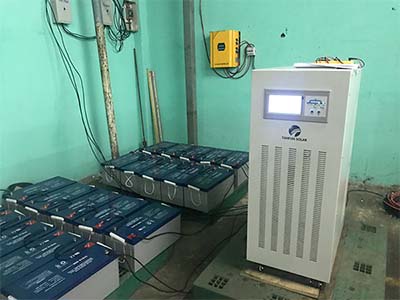 TANFON SOLAR
TANFON SOLAR
 December 17,2023
December 17,2023
Solar energy has become a game-changer in the quest for sustainable and eco-friendly power sources. As individuals and businesses increasingly turn to solar solutions, one common question emerges: How many kilowatt-hours (kWh) will a 5-kilowatt (kW ) solar system produce? In this article, we delve into the intricacies of solar energy, exploring the factors that influence a 5kW solar system's output and providing practical insights for current and prospective solar system owners.
I. Introduction
A. The Power of Solar Energy
The sun, a boundless source of energy, has become a focal point in the pursuit of sustainable power. Solar energy, harnessed through solar panels, offers a clean and renewable alternative to traditional electricity sources.
B. The Need for Understanding
As solar energy gains popularity, it's crucial for individuals to grasp the fundamentals of solar system capacity and production. This understanding empowers users to make informed decisions about their energy needs and environmental impact.
II. Understanding Solar System Capacity
A. The Basics: kW vs. kWh
Before delving into the specifics of a 5kW solar system, it's essential to differentiate between kilowatts (kW) and kilowatt- hours (kWh). While kilowatts represent the system's capacity, kilowatt-hours measure actual energy production over time.
B. The Role of Solar Panel Capacity
The capacity of a solar system, measured in kilowatts, directly influences its ability to generate electricity. A 5kW system indicates a higher capacity than a 3kW system, resulting in increased energy production potential.
III. Factors Influencing Solar System Output
A. Location Matters
The geographical location of a solar system plays a pivotal role in its output. Areas with ample sunlight will yield more kWh over time compared to regions with frequent cloud cover.
B. Weather Conditions
While sunlight is crucial, weather conditions also impact a solar system's performance. Understanding how various weather patterns affect energy production helps users set realistic expectations.
C. Solar Panel Efficiency
Not all solar panels are created equal. The efficiency of solar panels influences how effectively they convert sunlight into electricity. High-efficiency panels can maximize energy production.
IV. Calculating Energy Production
A.The Formula
Estimating the kWh production of a 5kW solar system involves a straightforward formula: multiply the system's capacity (kW) by the average daily sunlight hours.
B. Real-World Examples
To provide practical insights, let's consider examples based on different locations. A 5kW system in sunny California may produce more kWh annually than a similar system in a cloudier area.
...
Conclusion
In conclusion, the output of a 5kW solar system is influenced by various factors, and understanding these nuances is key to optimizing its performance. As we move toward a future dominated by sustainable energy, embracing solar solutions becomes not just a choice but a responsibility. By demystifying the complexities surrounding solar energy production, we empower individuals to contribute to a greener and more sustainable world.
Frequently Asked Questions
-
How do I calculate the potential kWh production of my 5kW solar system?
- Use the formula: kWh = kW × average daily sunlight hours.
- Use the formula: kWh = kW × average daily sunlight hours.
-
What role does weather play in solar system output?
- Weather conditions affect sunlight availability, impacting a system's daily energy production.
- Weather conditions affect sunlight availability, impacting a system's daily energy production.
-
Are all 5kW solar systems the same in terms of efficiency?
- No, the efficiency of solar panels varies, influencing the overall performance of the system.
- No, the efficiency of solar panels varies, influencing the overall performance of the system.
-
Can I upgrade components of my 5kW solar system for better efficiency?
- Yes, upgrading components like inverters or opting for high-efficiency panels can enhance system performance.
- Yes, upgrading components like inverters or opting for high-efficiency panels can enhance system performance.
-
What government incentives are available for installing a 5kW solar system?
- Government incentives vary by location; research local programs for potential rebates or tax credits.












